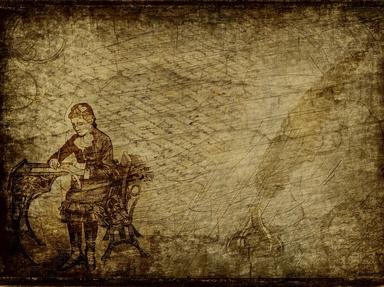Quiz Answer Key and Fun Facts
1. The character of Hedda was based in part on an actual person.
2. The entire play takes place in the drawing room of the Tesman's home, which is dominated by a large portrait of General Gabler. What was his relationship to Hedda?
3. During what season does the play take place?
4. Tesman has a close relationship with his maiden aunt Juliana, who has been like a mother to him following the early deaths of his parents. Hedda clearly finds her company and her fawning over her nephew quite tiresome, and carelessly (or so it seems) disparages this article of her clothing, possibly in an attempt to keep her at a distance.
5. Shortly after Aunt Juliana leaves, the Tesmans receive a visit from Mrs. Thea Elvsted (nee Rysing) a former schoolmate of Hedda's and an old flame of George's. Hedda had never liked Thea and found a particular physical feature of hers to be especially irritating; what was it?
6. Hedda contrives to have a private interview with Mrs. Elvsted, during which she learns a number of extraordinary things concerning her relationship with Eilert Lovborg, who had previously had an intimate friendship with Hedda herself. Which of these does Mrs. Elvsted NOT reveal to Hedda?
7. At the beginning of Act II, Hedda is called upon by Judge Brack, a friend of hers who had arranged the purchase of the villa in which she and George now live. In what extraordinary way does she greet him upon his arrival?
8. During her conversation with Judge Brack, Hedda offers numerous reasons for her marriage to the tedious and conventional Tesman. Which of these is NOT a reason she offers for accepting his proposal?
9. Midway through Act II, the much talked-about Eilert Lovborg finally makes his appearance. After exchanging pleasantries with Tesman and Judge Brack, he and Hedda contrive to have a private talk about their past relationship. It is revealed that Hedda ended the relationship; what, according to her, was her reason for doing so?
10. Lovborg recalls that at the end of their relationship, Hedda had threatened to shoot him. What reason does she give for her failure to do so?
11. Lovborg at first resolutely refuses to drink any alcohol during his visit to the Tesmans' villa. However a certain statement of Hedda's angers him, and he retaliates by downing two glasses of punch. What is it that Hedda reveals?
12. At the end of Act II, much to Mrs. Elvsted's dismay, Lovborg changes his mind and decides to accept Judge Brack's invitation to a dinner party at his home. Hedda "comforts" Thea by assuring her that Lovborg will return at ten o'clock. In what fanciful manner, suggestive of a certain god from pagan antiquity, does Hedda imagine Lovborg returning?
13. Act III takes place early the following morning when, to Mrs. Elvsted's dismay, Lovborg has not yet returned from the party at Judge Brack's. Tesman eventually returns and informs Hedda of a number of things which occurred at the dinner party concerning Lovborg. Which of these does he NOT tell her about Lovborg?
14. Tesman reads a letter sent to him from Aunt Juliana summoning him to the bedside of her sister, Aunt Rina, who is near death. Hedda refuses to accompany him on his final visit to his aunt; what reason does she give for doing so?
15. After Tesman's departure, Judge Brack arrives and provides Hedda with further details of Lovborg's drunken debauch on the previous evening. In particular, he informs her of an occurrence which he is certain will destroy Lovborg's reputation and cause him to be turned away from any respectable household. What was it?
16. After Brack leaves, Lovborg arrives in search of Mrs. Elvsted. When she appears, he is forced to admit that he does not have the manuscript, and tells her that he had destroyed it, much to her despair. To what does Mrs. Elvsted compare the destruction of the manuscript?
17. One of the most memorable scenes of the play- or indeed of any play- is the conclusion of Act III. Alone, Hedda produces the manuscript and, opening the door of the stove, feeds it to the flames. What memorable line does she utter while destroying the manuscript?
18. Near the beginning of Act IV, Hedda informs Tesman that she has destroyed Lovborg's manuscript. Tesman is appalled, and asks Hedda how she could have done such a thing. What answer does she give?
19. Mrs. Elvsted appears, in a state of terrible anxiety, having heard some disquieting rumors about Lovborg being hospitalized. Judge Brack soon appears and confirms her worst fears: Lovborg has shot himself in the breast and lies in a hospital, near death. Thea and Tesman are dismayed by the news, but Hedda regards it as a beautiful act of renunciation. Brack, however, takes her aside and informs her that Lovborg's death was far from the courageous, noble act she has envisioned. Which of the following does he NOT tell her about Lovborg's death?
20. Act IV ends with Hedda taking her own life after realizing that her illusion of Eilert Lovborg ending his life "beautifully" has gone sordidly wrong, that Tesman and Thea will reproduce the work of Lovborg's that she had exultantly destroyed, and that she is now under the power of Judge Brack. To whom does she address her final line in the play, before shooting herself?
Source: Author
jouen58
This quiz was reviewed by FunTrivia editor
gtho4 before going online.
Any errors found in FunTrivia content are routinely corrected through our feedback system.
